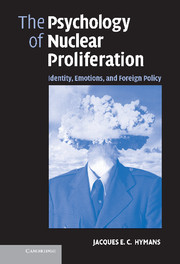Book contents
- Frontmatter
- Contents
- List of figures
- List of tables
- Preface
- List of acronyms and abbreviations
- 1 Introduction: life in a nuclear-capable crowd
- 2 Leaders' national identity conceptions and nuclear choices
- 3 Measuring leaders' national identity conceptions
- 4 The struggle over the bomb in the French Fourth Republic
- 5 Australia's search for security: nuclear umbrella, armament, or abolition?
- 6 Argentina's nuclear ambition – and restraint
- 7 “We have a big bomb now”: India's nuclear U-turn
- 8 Conclusion: lessons for policy
- Appendix: Coding rules and results
- Bibliography
- Name index
- Subject index
4 - The struggle over the bomb in the French Fourth Republic
Published online by Cambridge University Press: 22 September 2009
- Frontmatter
- Contents
- List of figures
- List of tables
- Preface
- List of acronyms and abbreviations
- 1 Introduction: life in a nuclear-capable crowd
- 2 Leaders' national identity conceptions and nuclear choices
- 3 Measuring leaders' national identity conceptions
- 4 The struggle over the bomb in the French Fourth Republic
- 5 Australia's search for security: nuclear umbrella, armament, or abolition?
- 6 Argentina's nuclear ambition – and restraint
- 7 “We have a big bomb now”: India's nuclear U-turn
- 8 Conclusion: lessons for policy
- Appendix: Coding rules and results
- Bibliography
- Name index
- Subject index
Summary
Introduction
“Hurray for France! From this morning she is stronger and prouder!” Such was the February 13, 1960 reaction of President Charles de Gaulle to the news of the first French nuclear explosion. Since that day, it has been hard to dissociate the French nuclear arsenal from de Gaulle's foreign policy of grandeur, from the “monarchical” presidential system he introduced in 1958, and indeed from overall French national identity. But in fact, the coming of the French nuclear arsenal was far from foreordained. Indeed, on several occasions the French Fourth Republic establishment almost succeeded in signing away France's rights to nuclear weapons.
This chapter details the struggle over the bomb in the French Fourth Republic. It argues that this struggle reflected the very different conceptions of French national identity that were held by French “Europeans” and by French “nationalists.” As detailed in Chapter 3, the “Europeans,” who dominated the French Fourth Republic establishment, held an oppositional subaltern NIC vis-à-vis Germany. This NIC led them to be hostile to the idea of a French nuclear weapons drive. By contrast, the “nationalists,” including de Gaulle and Pierre Mendès France, held an oppositional nationalist NIC vis-à-vis Germany. This NIC led them to embrace the idea of a French nuclear weapons drive, a drive that Mendès France jumpstarted with his dramatic nuclear decision of December 26, 1954.
- Type
- Chapter
- Information
- The Psychology of Nuclear ProliferationIdentity, Emotions and Foreign Policy, pp. 85 - 113Publisher: Cambridge University PressPrint publication year: 2006



